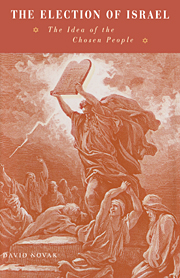Book contents
- Frontmatter
- Contents
- Preface
- List of abbreviations
- General note
- Introduction
- 1 Spinoza and his challenge
- 2 Hermann Cohen's concept of election
- 3 Franz Rosenzweig's return to the doctrine
- 4 The retrieval of the biblical doctrine
- 5 The rabbinic development of the doctrine
- 6 Two medieval views of election
- Conclusion
- Appendix 1 Some major Jewish thinkers cited
- Appendix 2
- Appendix 3
- Appendix 4
- Bibliography
- Index
2 - Hermann Cohen's concept of election
Published online by Cambridge University Press: 18 December 2009
- Frontmatter
- Contents
- Preface
- List of abbreviations
- General note
- Introduction
- 1 Spinoza and his challenge
- 2 Hermann Cohen's concept of election
- 3 Franz Rosenzweig's return to the doctrine
- 4 The retrieval of the biblical doctrine
- 5 The rabbinic development of the doctrine
- 6 Two medieval views of election
- Conclusion
- Appendix 1 Some major Jewish thinkers cited
- Appendix 2
- Appendix 3
- Appendix 4
- Bibliography
- Index
Summary
SPINOZA AND COHEN
It is hard to imagine any philosopher having a greater aversion to any other philosopher than Hermann Cohen to Spinoza. This aversion stemmed from the two most important aspects of Cohen's life: his being a Jew, and his being a philosopher. He believed that Spinoza had done great and almost irrevocable harm to the two cultural institutions Cohen loved most: Judaism and philosophy.
As a Jew, Cohen was outraged at what he considered Spinoza's slander of Judaism. That slander consisted primarily of Spinoza's contention that Judaism is devoid of any genuine theoretical content, the type of content in which philosophy is truly interested. For Spinoza, as we have already seen, Judaism only has value as a political phenomenon, and even that value is by now largely passé. At best it could only function as a somewhat remote historical analogy to the modern democratic state Spinoza envisioned for his time and place. Cohen was well aware that this characterization of Judaism had been enormously influential on subsequent thinkers, even on Cohen's own philosophical inspiration: Immanuel Kant. Because of this, Cohen devoted considerable effort to refuting Spinoza's claims in order to rescue Judaism for serious philosophical interest once again, just as Cohen was convinced that Maimonides (who was his Jewish inspiration) had done in an earlier age. Thus, whereas Spinoza had made an absolute distinction (at least in Cohen's mind) between theory and praxis, seeing philosophy as the epitome of the former and Judaism as a mere example of the latter, Cohen insisted that “the theory of praxis alone is, however, philosophy.”
- Type
- Chapter
- Information
- The Election of IsraelThe Idea of the Chosen People, pp. 50 - 77Publisher: Cambridge University PressPrint publication year: 1995



